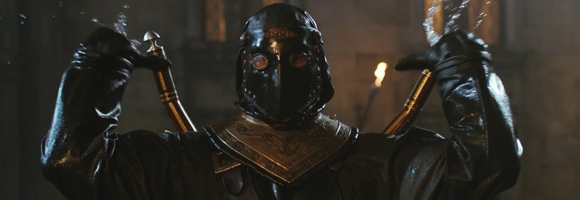clockpunk musketeers

The moment he emerged from the water in full 3D glory his equipment at once reminded me of the ↵industrial tribal art, and I already liked the movie. The majority of the critics’ reviews paints a less favorable picture, though. Nevertheless those reviews pour quite some water on my mills.
Alonso Duralde for example ↑wrote for Reuters: “The creators of the umpteenth new adaptation of ‘↑The Three Musketeers‘ [Anderson 2011] decided that the classic novel really needed a giant blimp battle, high-tech booby traps, bird droppings, ‘Matrix’-esque slo-mo fight scenes and scads of computer-generated French soldiers.” [bold emphasis mine] Then he goes on to bash the movie exuberantly.
The Schlock Mercenary in turn ↑is way more friendly. Like me he seemed to have dug the movie right from the beginning:
Once we’re done scrolling past a neat, toy-soldiers-on-map version of Europe, The Three Musketeers gives us a steampunk scuba diver emerging from the canals of Venice with repeating crossbows.
Okay, so it’s going to be THAT kind of movie. I mean, if this is seventeenth-century Italy we can’t even call the scuba rig “steampunk” because there aren’t any steam engines yet.
Well, at least your expectations have been set. It’s going to be THAT kind of movie. This isn’t historical fiction by a long shot. It misses the romanticized historical mark by a wide margin as well. What you’ve got here is full-on, brass-balls to the clockwork-secret-passage-wall alternate history. And if you can make it past the waterproof repeating crossbows, you’re in for a real ride. [bold emphasis mine]
This pins it down precisely. And yes, it’s not ↑steampunk, but ↑clockpunk, another one of the timepunk varieties—to all of which steampunk is the ancestor. The whole lot in turn consists of retrofuturistic ↑cyberpunk derivatives. And here we are.
The regular reader may have noticed that I am ↵striving to show that what I call the cyberpunk discourse sprouts, flourishes, and blooms ever more. ↑Alexandre Dumas‘ classic ↑swashbuckler adventure novel “↓The Three Musketeers” (1844) is no cyberpunk at all, of course. But just like the ↵zombie genre got infested by the cyberpunk discourse, the movie adaptations of other subject matters fall prey to it, too.

In the 2011 movie “The Three Musketeers” there are no plot elements which would justify to call it a cyberpunk story. But the æsthetics of cyberpunk and its derivatives reign. Not only all the technological artefacts, from the little gadgets to the huge blimps, but also the fighting choreography—everything is subdued to it.
With ↑Paul W. S. Anderson as the director all of this is little wonder. In his first feature film ↑Shopping (1994) he already took up cyberpunkish issues and settings. His ↑Soldier (1998), a sidequel to ↑Blade Runner (Scott 1982), written by ↑David Peoples, who co-wrote the script of “Blade Runner,” is at the centre of the genre. ↑Death Race (2008) and its prequel ↑Death Race 2 (Reiné 2011—Anderson was writer and producer), and of course the ↑Resident Evil film series (Anderson 2002, Witt 2004, Mulcahy 2007 [Anderson was writer and producer of the latter two], Anderson 2010, 2012), prominently starring ↑Milla Jovovich, are all cyberpunk, too. After ↑The Fifth Element (Besson 1997) and ↑Ultraviolet (Wimmer 2006) Miss Jovovich by means of this series once and for all has established herself as the ↑ultimate cyberpunk chick kicking butt big time. So, as Milady de Winter she brings not only a lot of cuteness to “The Three Musketeers,” but a lot of cyberpunkishness, too.



Nice sum up – thanks! :) But what do you call those post-WWII technology fiction like “Tank Girl”?
“Tank Girl,” both the comic book series and the movie adaptation, I’d place into the cyberpunkish post-apocalypse congeries—like “Mad Max.”Mainly because it is set in the future, not in an alternative past (like material that qualifies as steampunk, clockpunk, or any other of the retrofuturistic timepunk subgenres). If it would be set in alternative 1930s/40s it’d most likely qualify as dieselpunk; alternative 1950s maybe atomicpunk. Depends on the kind of technology which is rendered as dominant. It of course is very doubtful if this blurry, fragmented taxonomy makes any sense at all …
The most decisive is zeph’s last two sentences imho.
Just posted ↵punk galore, my attempt to clean up the -punk mess.
..are..damn I shouldn’t post and work at the same time